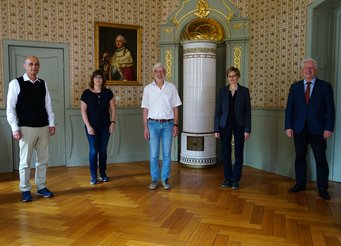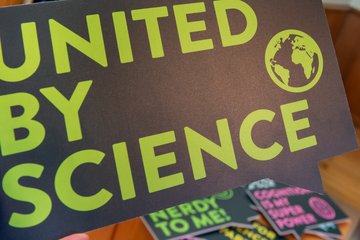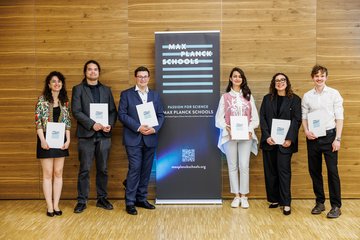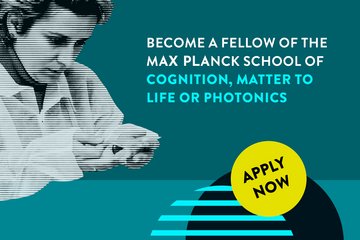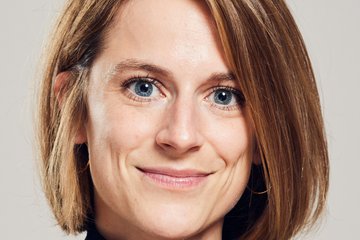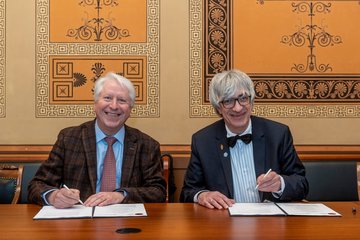
Partner Insights - Matter to Life: Heidelberg University
Heidelberg University, founded in 1386, is Germany’s oldest university and one of Europe’s most research-intensive institutions. With a long tradition of shaping the future, Heidelberg University offers a wide range of subjects and disciplines, and is committed to broadening and harnessing its knowledge and skills for the benefit of future generations.
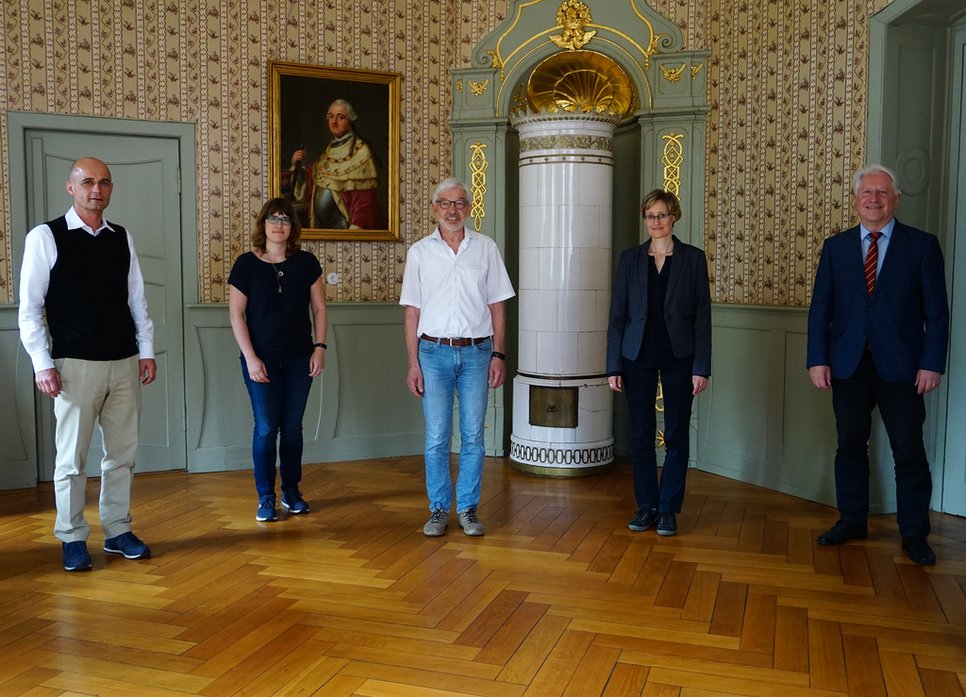
Assembly during pandemic times: meeting in person this summer between Bernhard Eitel (Rector of Heidelberg University), Anja-Désirée Senz (Vice-Rector Student Affairs and Teaching of Heidelberg University), Peter Comba (MPS MtL Executive Board member for Heidelberg University), Heike Boehm (MPS MtL General Scientific & Educational Coordinator) and Joachim Spatz (MPS MtL Chair) – from right to left.
Almost 30,000 students are enrolled in the twelve faculties of Heidelberg University, and more than 8,000 doctoral students are currently qualifying for their degree, most of them in structured doctoral programmes. Heidelberg University actively participates in a worldwide network of teaching and research collaborations: 27 institutional partnerships at the overall university level and exchange arrangements with over 450 universities throughout the world underscore the strength of Ruperto Carola’s international ties. Heidelberg’s international reputation is also substantiated by its Nobel laureates. 56 Nobel prize winners are connected with Heidelberg, eleven of whom were or still are professors at the University.
As molecular life sciences, chemistry, physics, materials science and molecular engineering represent research foci of the University that foster particularly high national and international visibility, Heidelberg University is ideally positioned to be one of the leading partners of the Max Planck School Matter to Life. Together with the University of Göttingen, Technical University of Munich, DWI Leibniz Institute for Interactive Materials and the Max Planck Society, Heidelberg University has initiated the Max Planck School Matter to Life in 2018 to answer one of the fundamental questions of mankind: “What, exactly, is life?” and “How can one engineer life-like systems?”.
Currently, 69 Master students and PhD candidates, together with 49 leading scientists in the newly evolving field of Matter to Life (the so-called “Fellows”), are collaborating within the School to answer this fundamental question. Scientists of Heidelberg University are particularly contributing through their expertise in molecular systems chemistry and engineering. The subject provides a multidisciplinary education as it comprises molecular systems engineering, chemistry, physics, biology, medicine and ethics.
What makes the Max Planck School Matter to Life so special is its direct track program, which gives Bachelor graduates an interdisciplinary and unique research environment to complete both their MSc and PhD in Matter to Life within five years. For that purpose, the Master’s program “Matter to Life” was newly established from scratch at Heidelberg University, University of Göttingen and Technical University of Munich. Prof. Dr Bernhard Eitel, Rector of Heidelberg University, points out: “Scientifically as well as structurally, this highly competitive Master-PhD-program is an innovative role model which opens up new perspectives for outstanding young researchers and future academic stars, bringing together the best of two worlds – the Max Planck Institutes and leading research universities.” Students are handpicked for the unique MSc to PhD direct track program, and the low intake number – e.g. 10 students per year at Heidelberg University – ensures an ideal student-to-faculty ratio, while enabling the School to offer support tailored to students’ individual needs and interests. The structure of the Max Planck School Matter to Life allows possible applicants to enter the program directly after the Bachelor, which matches well with given international standards and attracts international students in particular.
The collaborative spirit of the Max Planck School Matter to Life is at the heart of the newly established Master’s program “Matter to Life”. Three leading German universities – Heidelberg University, University of Göttingen and Technical University of Munich – have joined forces to offer the new MSc program to establish the “joint degree”. At Heidelberg University, the students admitted to the Master’s program are taught in close collaboration with the Master’s program “Matter to Life” at the University of Göttingen, and benefit from the teaching participation of all Matter to Life Fellows. For example, in their first semester all students attend a joint lecture on synthetic biology by Friedrich Simmel from Technical University of Munich.
The Master’s program is science driven and teaches interdisciplinary science, combined with modern didactic teaching methods like the “inverted classroom” model: students initially learn and work autonomously with the help of learning material provided by the lecturer. Subsequently, problems and questions are discussed, and knowledge is consolidated in the classroom together with the lecturer and fellow students. This not only connects different scientific disciplines but also improves core skills like problem solving approaches of the students. Joachim Spatz, speaker of the Max Planck School Matter to Life explains: “Since I am a Professor at Heidelberg University, I was seeking for an opportunity to get such an international, research driven and direct track-based program started which does not stop at single institutional boundaries. The Max Planck School offers this unique change in an ideal manner.”
Heidelberg has much more to offer than its university or the opportunity to do a direct track doctorate in the innovative scientific field of Matter to Life with Germany’s leading scientists: a rich industrial environment, the world-famous castle, the picturesque Old Town with its unique charm, or the inviting landscape between the Odenwald and the Rhine Valley. Additionally, Heidelberg and the Rhine-Neckar region shine with a rich and attractive cultural scene that covers every sphere and institution, where both cabaret artists and internationally acclaimed stars are at home. In this sense, both the city and Heidelberg University, together with the Max Planck School Matter to Life, offer a unique environment for launching a scientific career.
